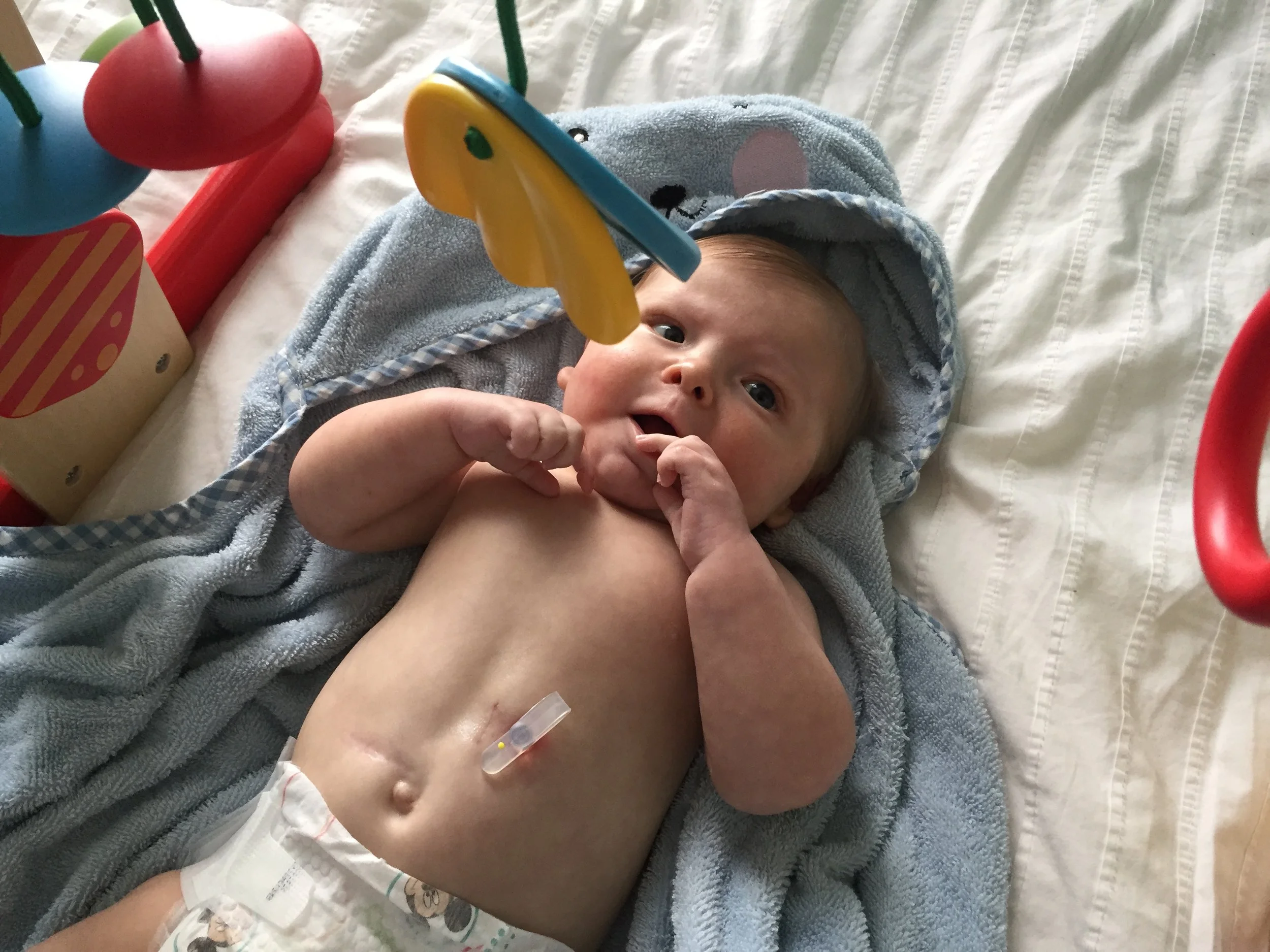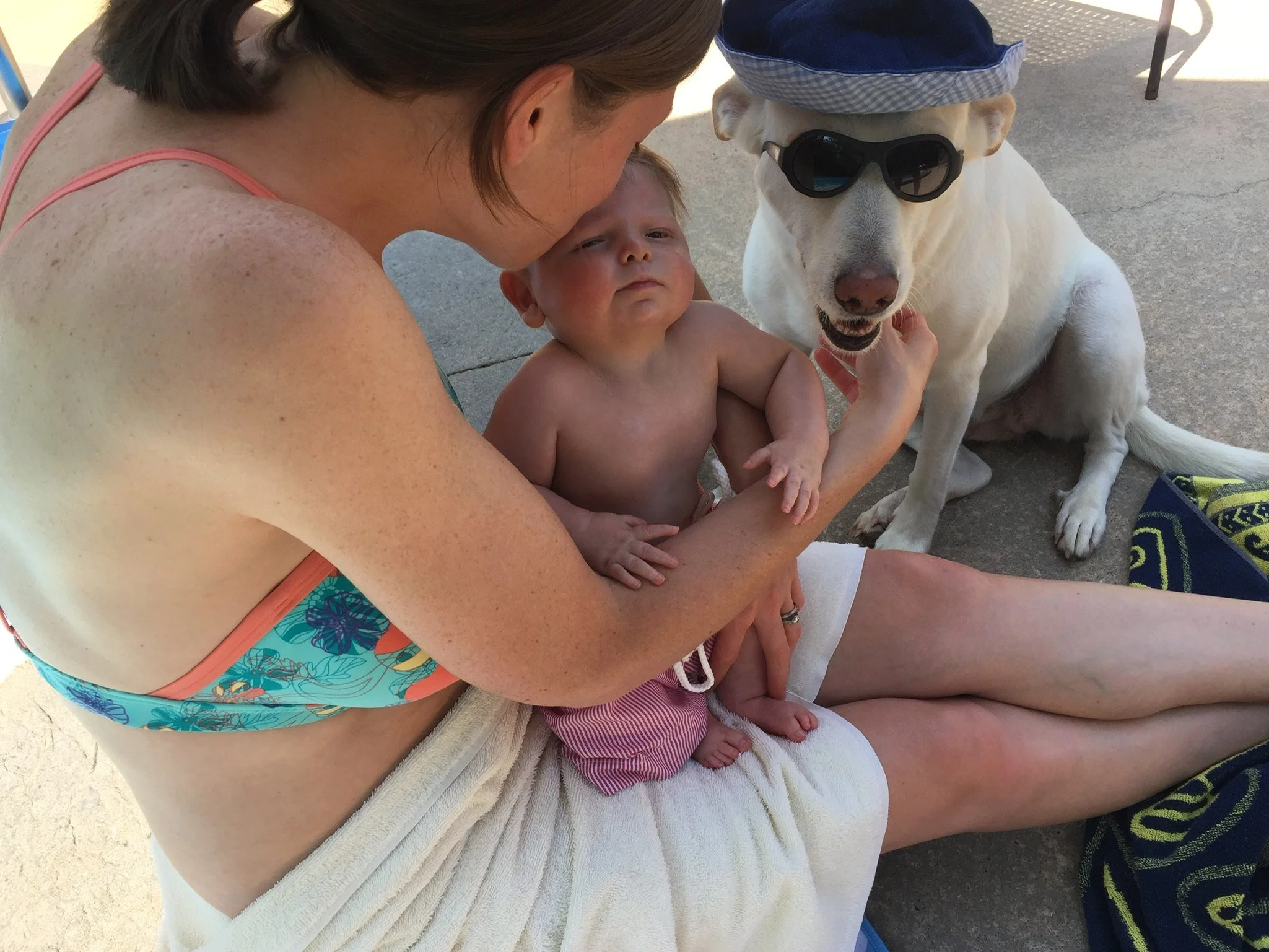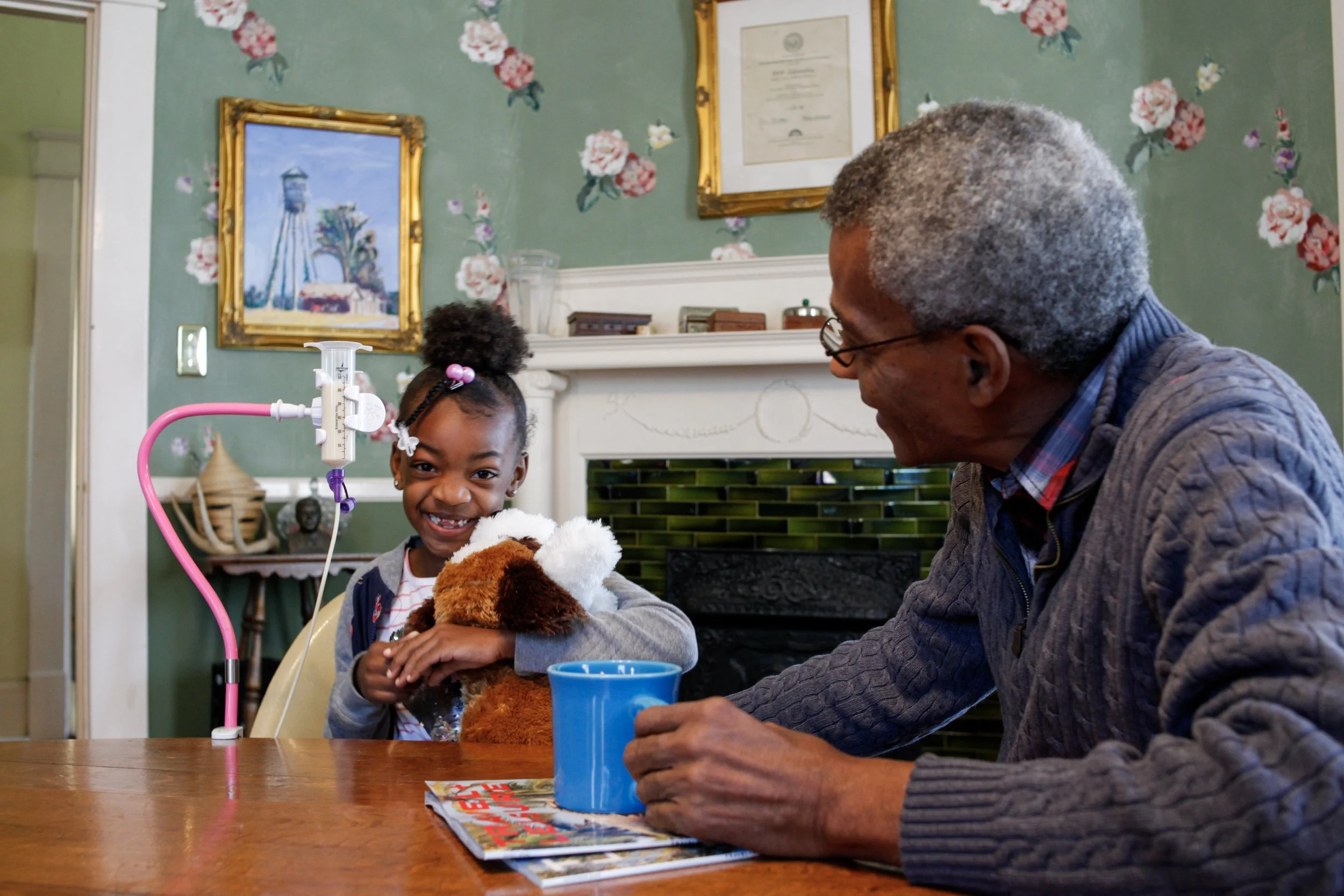A Legacy of Freedom
What began in a small-town garage in Arkansas is now supporting tube-feeding children and adults around the globe. All thanks to a boy named Freeman – and the parents determined to keep his impact alive.
“Families don’t need an IV pole, they need something that they can get out of the house with.”
All around the world, millions of people will resonate with this sentiment from Misti Staley. And because of Misti’s son, Freeman, that “something” exists.
The FreeArm is a flexible, clamp-on arm that serves as an extra hand for tube-feeding. Once attached to a table, cot, stroller or wheelchair, it securely holds syringes, pumps, or feed bags and makes feeding more convenient at home or on the go.
In short, it’s a very welcome helping hand for tube-feeding families. “So you’re able to leave that IV pole at the hospital,” says Misti, who lives with her husband, Will, in Helena, Arkansas.
FreeArm is currently, at Misti’s last count, supporting families in 28 countries. Its instruction manual has been translated into 11 different languages. And, in a 2023 survey of more than 800 people on nutrition support, 92 per cent felt more positive about their feeding tube after using the FreeArm.
All of this because of one little boy, whose legacy reaches far beyond the precious months he spent with his parents.
In April of 2015, Misti and Will welcomed Freeman Ellis Staley with no prior knowledge of his rare genetic condition, Beals syndrome, and the medical challenges he would face.
“After he was born, we saw that he had a small cleft palate in the very back of the roof of his mouth. So we knew from then that he would have some latching difficulties,” says Misti. “But then he was life-flighted to a NICU [neonatal intensive care unit] two hours from our house.”
Freeman would spend three and half months in the Arkansas Children’s NICU in Little Rock.
Here, Misti and Will learned he had a coloboma – a small gap in his eye – causing blindness, two holes in his heart, an extra rib and a horseshoe-shaped kidney. Freeman also had pulmonary hypertension and, for several days, relied on extracorporeal membrane oxygenation (ECMO) to do the work of his heart and lungs.
“The nurses had told me that ECMO babies are notoriously bad eaters, so Freeman had a good amount of stuff stacked against him,” says Misti, “but we were determined.”
During his first weeks, Freeman had already undergone surgery to remove a web-like structure between his stomach and intestines. ECMO also meant placing and removing cannulas in his neck, so when faced with the prospect of a surgically placed feeding tube, Misti felt, “that’s too much for my baby”.
“I put it off,” she says. “I was like, we can work on this at home, show me how to put in the NG [nasogastric] tube. I can do it!”
But Freeman had a knack for pulling his NG out and, after having it repeatedly reinserted in the NICU, Misti noticed his tongue was bruised. Freeman would also scream the whole way through those reinsertions.
“It was torture,” says Misti. “And that was when I realised, I can’t do this at home. Let's have the surgery. It was so tricky, but I do feel like it was the best decision not only for Freeman but for me, as a mum, to be able to know that I was feeding him safely.”
With a newly placed gastrostomy (G) tube, Freeman went home to Helena, a small Mississippi River town with fewer than 9000 locals.
Misti and Will had moved there in 2009 to help bolster what was then known as one of the most disadvantaged regions in the country. It was in this community that Will co-founded the social impact design firm, Thrive Inc.
“He wanted to see if having a design firm in a small town could make a difference – economic development-wise – by helping people start small businesses and by giving back through fun festivals that highlight different cultural things, like food and music of the region,” says Misti.
With a BA in Fine Art, Misti started running mural painting workshops with children in their new town. Today, as the CEO of FreeArm, she’s handed her brushes to Will.
“He manages Thrive – that’s his day-to-day – so he’s doing rebranding for cities in our region and he’s taken over the mural workshops,” says Misti. “Sometimes I get to sneak over and paint with them on a Friday, which is so fun.
“Thinking about it now, having my art degree pushed me to think outside the box – to think creatively – to think in fun, user-experience-type ways.”
In the latter half of 2015, Freeman came out of the NICU and spent five “hard, but wonderful” weeks at home. While Misti tried to replicate the rigging systems nurses had used for his tube-feeds, Will went to their garage and crafted the first FreeArm out of pieces of wood.
Then Freeman’s breathing became laboured and the family returned to hospital for a chest x-ray, unknowingly embarking on what would be a lengthy stay in the paediatric intensive care unit (PICU).
“We were telling our PICU nurses about what we had created at home and they said, ‘Oh my gosh, we need something like that in the hospital!’ That got us thinking – and we thought about it the whole five months we were in the PICU.
“Throughout that journey Freeman got a trach [tracheostomy]. But he ended up with holes in his lungs – and never could get off that roller coaster. Sadly, we lost him at almost 10 months old. But it was his tube-feeding story that inspired the FreeArm.”
FreeArm launched at the end of 2018 with the initial goal of getting it into the hands of families who could use it right away. The aim for 2020 was to expand into hospitals but, as Misti says, “there’s nothing like a global pandemic to throw a wrench in your plan”.
Despite the restrictions, hospitals kept reaching out with stories of nurses improvising – carefully, but precariously – by taping syringes to incubator warming lights, showing just how urgent the need was for a safer, more reliable solution.
Listening to families’ feedback, in 2020, Misti launched the stronger FreeArm Muscle to hold larger feeding bags. Over the past year, a hospital version was released with interchangeable adapters for different NICU incubators, allowing consistent tube-feeding from hospital to home.
“So a child can have the FreeArm in their incubator, then it can go to the chair for kangaroo [skin-to-skin] care, it can go to the open crib, and then hospitals can discharge the FreeArm home with families.”
FreeArm is also available through medical equipment suppliers and, increasingly, covered by insurance worldwide. It recently received its Conformité Européenne (CE) mark, certifying FreeArm for sale across Europe.
“We can now apply for reimbursement through the different health schemes of the different countries and be able to have it reimbursed in Europe, as well,” says Misti. “It’s kind of this long, steady, one-foot-in-front-of-the-other pace, but the goal for the FreeArm is to get it to everybody.”
Misti is a big advocate for the tube-feeding community – a global force she wouldn’t have been aware of if it weren’t for her son.
“Looking at it from the outside, it looks so small. But then once you’re involved in the community, you see everything that’s going on. And everyone is so connected and so supportive of each other. They just want to help and say, ‘I learned this and I want to tell you about it because maybe it’ll make it easier for you’. It’s unbelievably supportive.”
Losing Freeman is not the only heartache Misti and Will have endured in their experience of parenthood. Having had a miscarriage before Freeman came along, the couple went through IVF and struggled to produce a healthy embryo.
“We did do one transfer, but I lost that baby,” says Misti, who learned that she was pregnant again in 2022. “Our daughter’s name is Pearl, but I lost her at 18 weeks. I was induced and I had her, so I got to hold her, but she was very tiny. And then I was pregnant again, two other times, naturally – but I lost those pregnancies too.”
After all she’s been through, when asked why she chose to build a business in the medical-needs space, Misti says, “I thought that it was a healthy way to grieve”.
“I thought that giving back and continuing Freeman’s legacy through the FreeArm – and everything we had learned from him – would be a good, healthy way for me to know I’m getting out of bed to make a difference. And even though we lost Freeman, he’s still here with me, making a difference.
“To be honest, some days I think, is this healthy? It’s so hard. Not only because I’m so deeply involved in the tube-feeding community – sending flowers to families when they lose a child, or gift cards when they’ve been in the hospital for weeks to say, ‘please, go get dinner on me’, because I know how much that helped us – but also because it means staying in that trauma space.”
Since she had Freeman, Misti has supported her mental health through therapy – as was recommended by one of the social workers she met in the PICU. She and Will also go for a run together, every morning, and chat about what’s on their minds and their plans for the day ahead.
While their own children, Freeman and Pearl, would have been 10 and two, the duo supports countless other kids through their work. Will’s design firm offers paid internships and creative career paths to local high-school students, while FreeArm offers ease and freedom to families across the globe.
To those who are new to tube-feeding, Misti’s advice is “connect with others”.
“I highly recommend the tube feeding community,” she says. “And just going on Instagram and searching for the hashtags of whatever diagnosis your child or you have, or might have, and then connecting with people and families. Or just following along and watching them for a little while to see, what are they doing in their life? Just to know that they’re there when you’re ready and able to reach out, I think, would be so helpful.”






